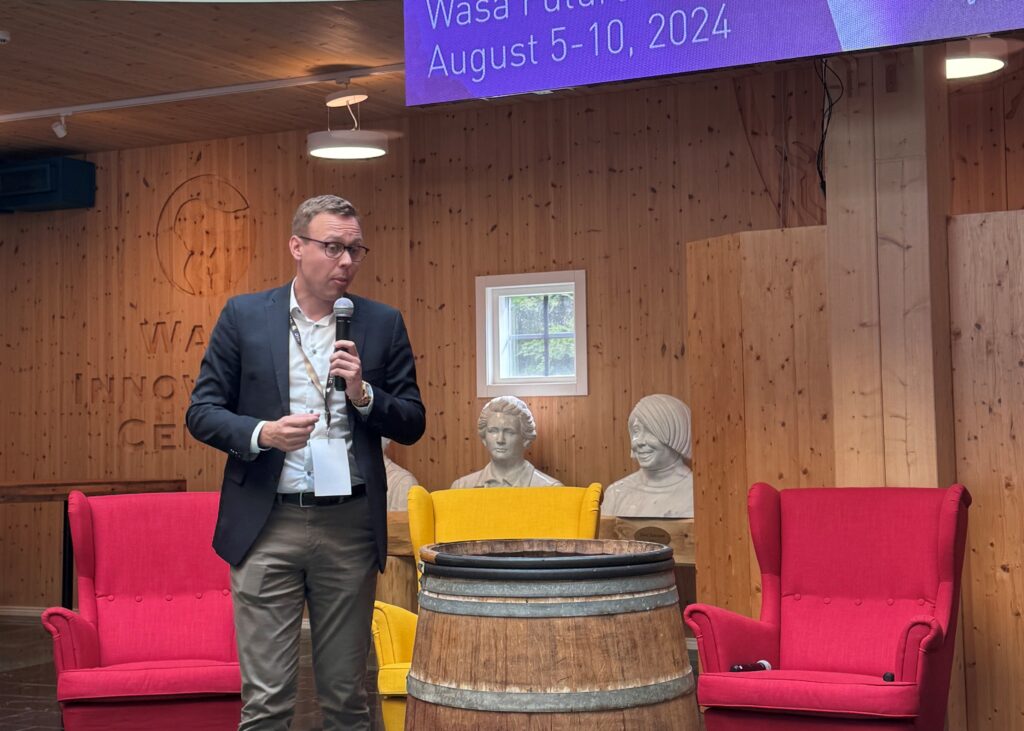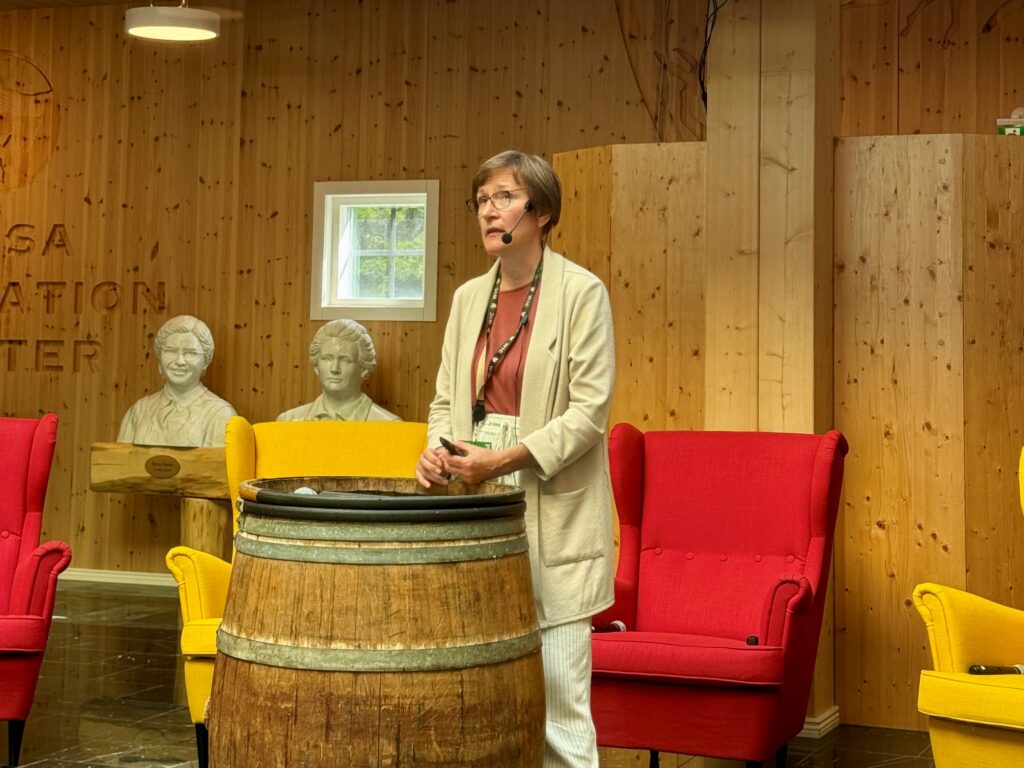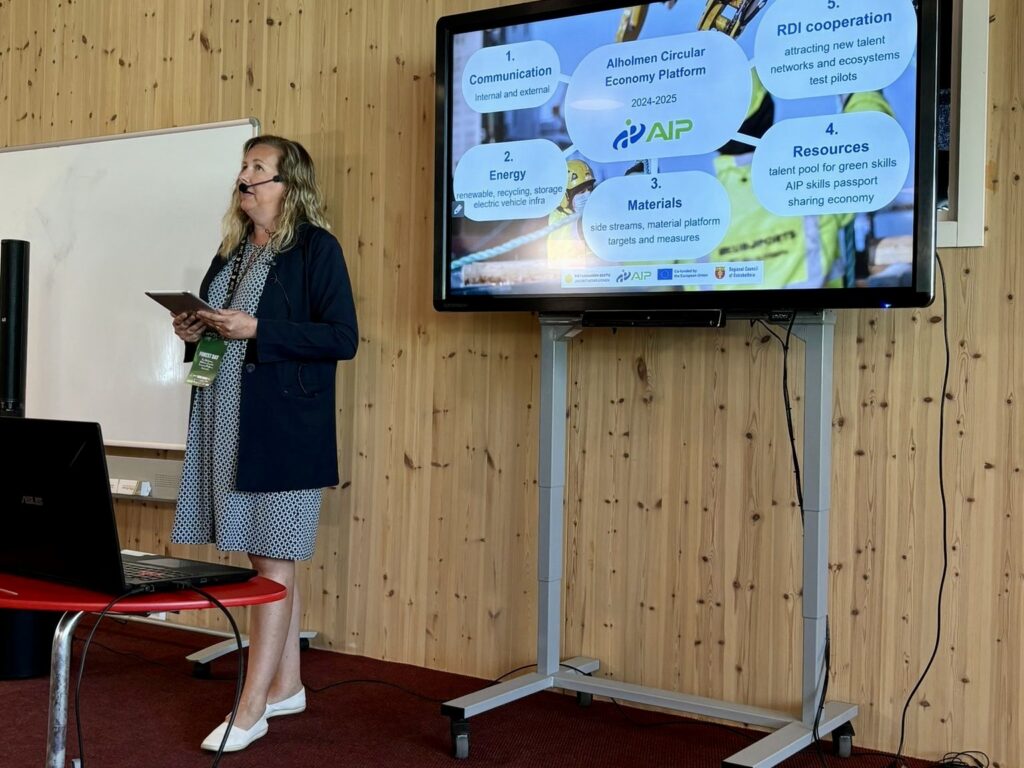On 5 August, the five-day Wasa Future Festival kicked off with a day of seminars focusing on the potential of forests and wood and the vitality of rural areas. The opening seminar, organised by the Regional Council of Ostrobothnia, brought together several high-profile speakers
Minister-to-be predicts a busy political autumn
After introductory words by Mats Brandt, Regional Mayor, Matias Marttinen (The National Coalition Party), Member of Parliament and future Minister of Labour, spoke about the government’s investments in the green transition. Marttinen is looking forward to a busy political autumn in terms of central government finances, but at the same time promised smoother permit processes for investments and industrial establishments.

UPM’s birch cellulose has excellent value-adding potential
State Secretary Päivi Nerg from the Ministry of Agriculture and Forestry continued the programme by talking about the national forest strategy and the importance of rural areas and forests for the welfare of society. She emphasised that bioeconomy and the sustainable use of renewable natural resources will become increasingly important in the future, while highlighting Ostrobothnia as a positive role model for other regions.
Professor Monika Österberg from Aalto University presented new innovations in the forest sector and the results of the first report of the Metsäbiotalouden science panel ‘Lankusta lääkkeisiin – Tuoteportfolion arvonnoususta uutta arvonlisää metsäsektorille’. According to the report, it is possible to significantly increase the added value generated by forests without increasing the volumes of forest fellings.
-This requires highly processed wood products, says Professor Monika Österberg, who coordinated the study.
She mentioned birch cellulose from UPM’s mill in Pietarsaari, which is processed into nanocellulose, as a product with many future processing opportunities in the clinical and pharmaceutical industries. The report of the scientific panel led by Professor Monika Österberg can be read in full here: https://metsatiedepaneeli.fi/wp-content/uploads/2024/04/Lankusta-laakkeisiin-Tuoteportfolion-arvonnoususta-uutta-arvonlisaa-metsasektorille.pdf

The Chief Economist of the Finnish Forest Industries Federation, Director Maarit Lindström, gave the audience an overview of the importance of the sector for the national and regional economy. Forests are Finland’s most important natural resource and the economic importance of the forest industry is high despite economic fluctuations. The forest industry plays a more important role in the Ostrobothnian economy than in other Finnish regions, employing around 2,400 people directly in Ostrobothnia (2021) and paying out a total of EUR 100 million in wages.
-The future looks bright, as the total global market for forest industry products is expected to grow by EUR 175 billion in 2022-2023, and Finland and the forest industry have good opportunities to benefit from the global green transition, says Director Maarit Lindström.
-The Finnish forest industry is an international leader when it comes to developing new products and Finland is actually a world leader when it comes to patents in the forest industry sector, she continues.
AIP on the way to becoming a leading eco-industrial park
AIP’s circular economy work was highlighted by Åsa Björkman, project manager of the Alholmen Circular Economy Platform. The ACEP project was presented at Wasa Future Festival as an inspiring circular economy working method for local industry. According to AIP’s 2023 strategy, AIP aims to become a leading eco-industrial park in Finland. Green transition is central and the forest industry acts as a motor by accelerating and motivating other industries in the transition work.
-AIP’s large-scale international industrial players with ambitious circular economy targets are speeding up the transition process for smaller companies in the industrial sector, Björkman says.
ACEP shows that projects in practice can create structures that are integrated into industrial processes and contribute to both economic and environmental progress in sustainability. Today, different industries within Alholmen collaborate to benefit from each other’s competences and resources, and this collaboration is strengthened by the project. There is probably a lack of actors not yet involved in recycling processes and logistics.
-We hope to identify and start filling these gaps, Björkman explained.

Esse – a smart energy village
Ingvar Kulla, CEO of Esse Elektro-kraft and Mathias Högbacka, CEO of Aktion Österbotten, talked about innovation projects and initiatives in the energy sector in Ostrobothnia.
A unique circular business model has been created based on batteries from crash-damaged and dismantled electric and hybrid cars. A car taken in by the insurance company is on average about 5 years old, while the warranty period of the electric car battery is 5-8 years. This means that there is no immediate secondary market for these recovered used batteries. The business model is based on the battery first being used in energy storage, to be recycled after a few years as spare parts for cars. This resulted in the relatively new company Autocirc Battery Recycling Finland, in which Esse Elektro-kraft is a minority shareholder. The first energy storage facility, a 1 MWh plant, is currently being installed.
Esse Elektro-kraft has also built a 1 MWh solar park together with the municipality of Pedersöre. The investment in solar power continues with the purchase of a shut-down mink- and foxfarming area in 2023. The buildings were demolished and the ground was levelled for the first 2 MWh plant. There is a reservation for another 6-7 MWh on the same area.
-Abandoned farm sites are excellent areas for solar parks. No forests need to be harvested or valuable agricultural land exploited, says Ingvar Kulla.
Also involved in the innovation process together with Esse Elektro-kraft was the RIPEET pilot project, an EU-funded project administered regionally by Aktion Österbotten.
-In short, our role was to develop a model of how to develop smart energy villages locally. Esse in Pedersöre is one of the projects, says Mathias Högbacka.
If you are interested in watching the streaming of the event, it is available on Youtube: https://www.youtube.com/@wasafuturefestival1521

